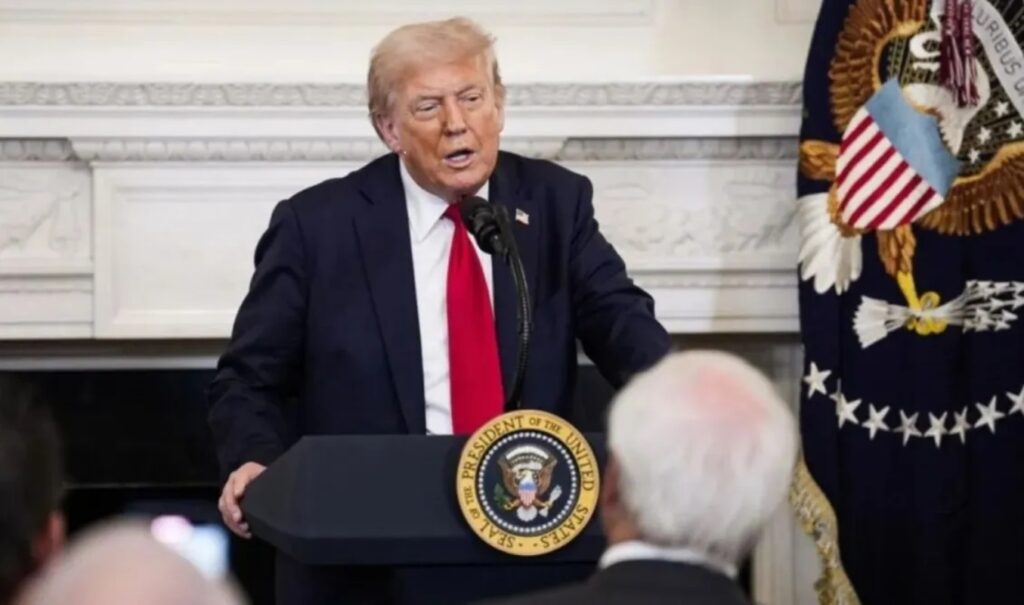An artist who first accused Jeffrey Epstein and Ghislaine Maxwell of sexual assault nearly three decades ago told the New York Times that she had urged law enforcement officials at the time to investigate powerful figures in their circle, including Donald Trump, as reported by the Guardian.
Allegations of 1995 meeting with Trump at Epstein’s office
The artist, Maria Farmer, was among the first women to report Epstein and his associate, Ghislaine Maxwell, for sexual crimes in 1996 when, according to a new interview with the Times, she also identified Trump among others close to Epstein as worthy of attention. Farmer repeated this message, she told the Times, when she was re-interviewed by the FBI about Epstein in 2006. She specifically named Trump due to a “disturbing” late-night encounter with him in 1995 at Epstein’s offices, which she said she reported to agents at the time and has since described publicly.
Farmer told the Times that she has “wondered for a long time” how law enforcement handled her allegations in 1996 and 2006. In 2008, Epstein reached a deal with federal prosecutors in southern Florida that allowed him to avoid more serious federal charges while pleading guilty to state charges of procuring minors for prostitution and solicitation of prostitution. Investigators say he died by suicide in 2019 in jail while awaiting trial for child sex trafficking.
Maxwell was sentenced in 2022 to 20 years in prison for sex trafficking. Farmer’s account could shed light on the context in which Trump’s name may appear in unpublished records related to Epstein, an issue that has created anger and division among the usually loyal supporters of the American president.
Any documented evidence of Farmer’s efforts to direct FBI attention to Epstein’s associates could prove politically difficult for Trump, who has tried – but failed – to deflect attention from his ties to the convicted sex offender. Farmer’s account could also fuel further distrust in the official version of events, including findings that Epstein died by suicide.
Epstein’s massive files almost certainly contain many records that have not been made public, and likely include names and details of consultations, evidence, testimony and relationships collected during the investigation – but may not have been verified or relied upon in his and Maxwell’s prosecutions. Law enforcement has not charged Trump with any offense related to Epstein, and he has never been named as a target of any investigation.
The White House disputed Farmer’s claims and told the Times that Trump ended his friendship with Epstein many years ago.
Trump’s relationship with Epstein has come under intense renewed scrutiny since his attorney general, Pam Bondi, and FBI director, Kash Patel, “backed down” from previous commitments to release Epstein’s investigative files.
Trump has responded to backlash from his supporters – and Democrats – with increasing anger. But this has not neutralized the backlash, and Trump subsequently called for unsealing depositions and other documents, saying he has nothing to hide.
Farmer was in her mid-twenties when she worked for Epstein in 1995 and 1996, initially acquiring artwork on his behalf, but later staffed the reception of his Upper East Side home and supervised the coming and going of girls, young women and celebrities.
Epstein to Trump: “No, no, she’s not here for you” – What Maria Farmer alleges
One evening in 1995, Farmer said she was summoned to Epstein’s offices in a luxury Manhattan building. She arrived wearing athletic shorts. Trump then appeared wearing a suit, according to Farmer. Farmer said she felt frightened as Trump stood over her, looking at her bare legs. Epstein entered the room, and she remembered him telling Trump: “No, no. She’s not here for you.”
The two men left the room, and Farmer said she heard Trump comment that he thought she was 16 years old. Farmer told the Times she had no other “disturbing” interactions with him and never saw him engage in inappropriate behavior with other girls or women.
White House Communications Director Steven Cheung told the Times, “The president was never at his office,” referring to Epstein. “The fact is that the president kicked him out of his club because he was disgusting.”
White House Press Secretary Karoline Leavitt said: “The hack reporters at NYTimes are desperately trying to recycle news to try to connect President Trump to Jeffrey Epstein. It’s not news that Epstein was a member of the Mar-a-Lago club, because it’s the same club from which Donald Trump kicked Epstein out because he was disgusting. These stories are tiresome and pathetic attempts to distract from all the success of President Trump’s administration.”
The president’s position on Epstein has changed over time. Trump in 2002 had referred to Epstein as a “fantastic guy” – and there are videos of the two celebrating together in New York, years before he entered politics. In 2019, Trump repeatedly told reporters he was not a “fan” of Epstein and had cut ties with him two decades earlier. In August of that year, after Epstein’s death, Trump retweeted a post claiming that former US President Bill Clinton was connected to Epstein’s death. (Clinton has denied any knowledge of Epstein’s crimes and has denied ever visiting his private island).
In his 2024 campaign, Trump strongly hinted that he was inclined to favor releasing federal files on Epstein amid mounting pressure from his base and high-profile supporters who have long suspected foul play by authorities, partly to cover up a much larger criminal scandal involving wealthy and powerful Democrats.
The Times story, published Sunday, came just days after the Wall Street Journal reported that Trump in 2003 sent Epstein a sexually suggestive birthday greeting. Trump called the report a hoax and filed lawsuits against the news organization and its owners, including Rupert Murdoch, for at least $10 billion for defamatory libel.
With information from Guardian




